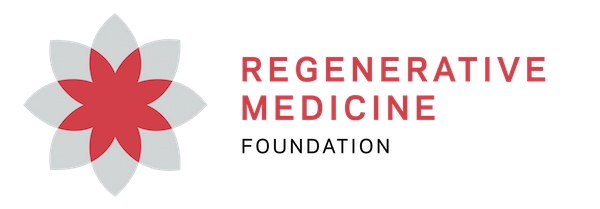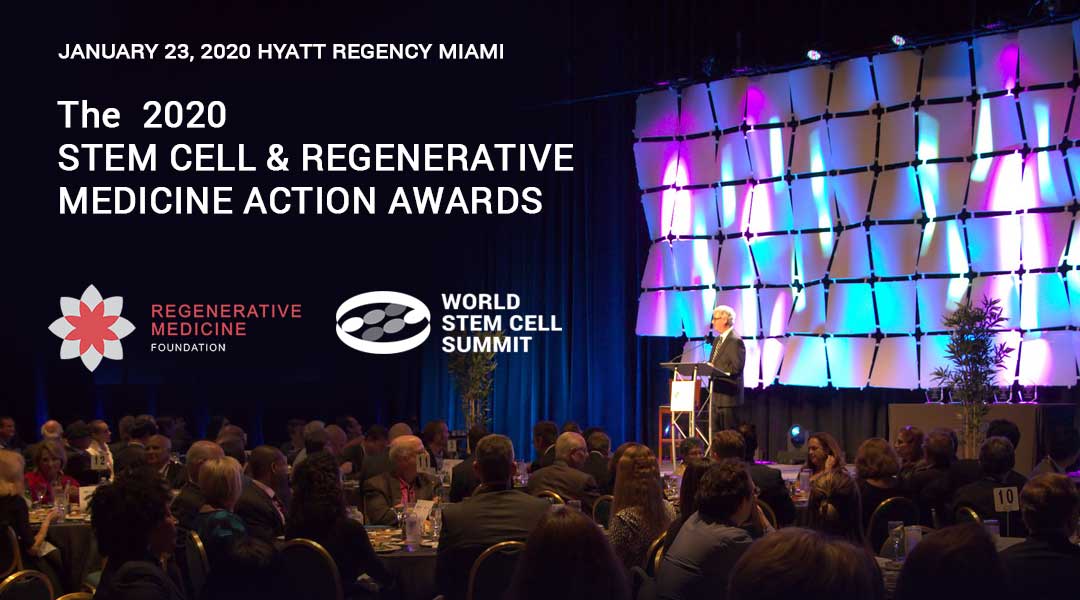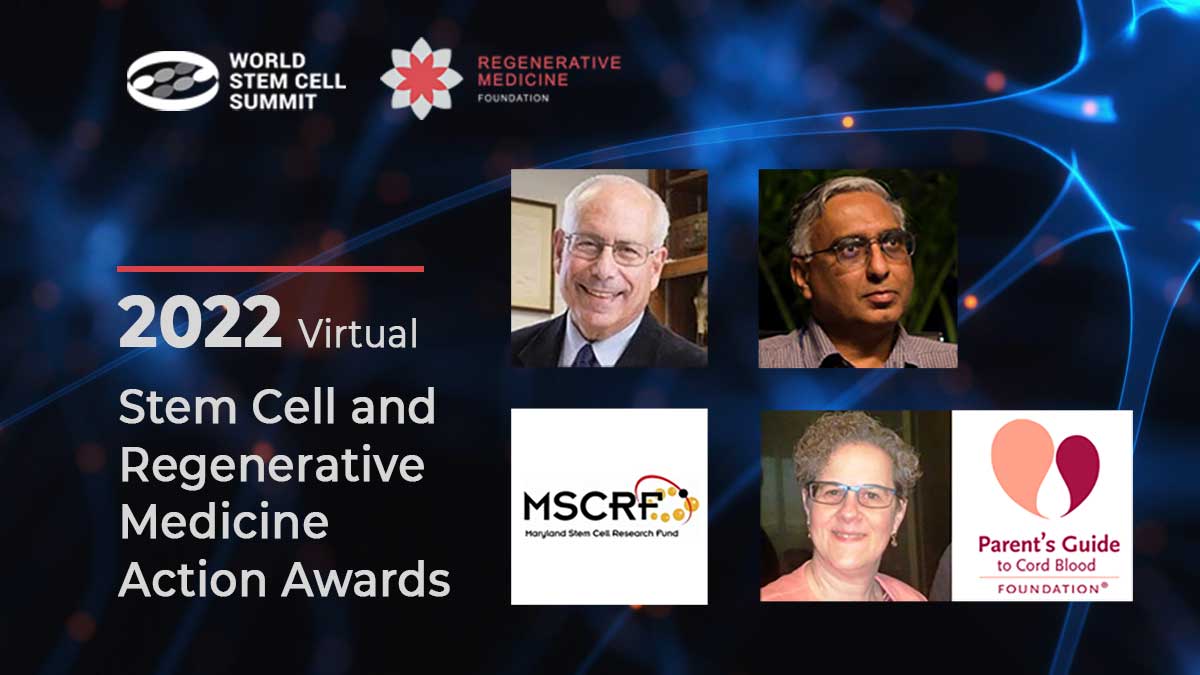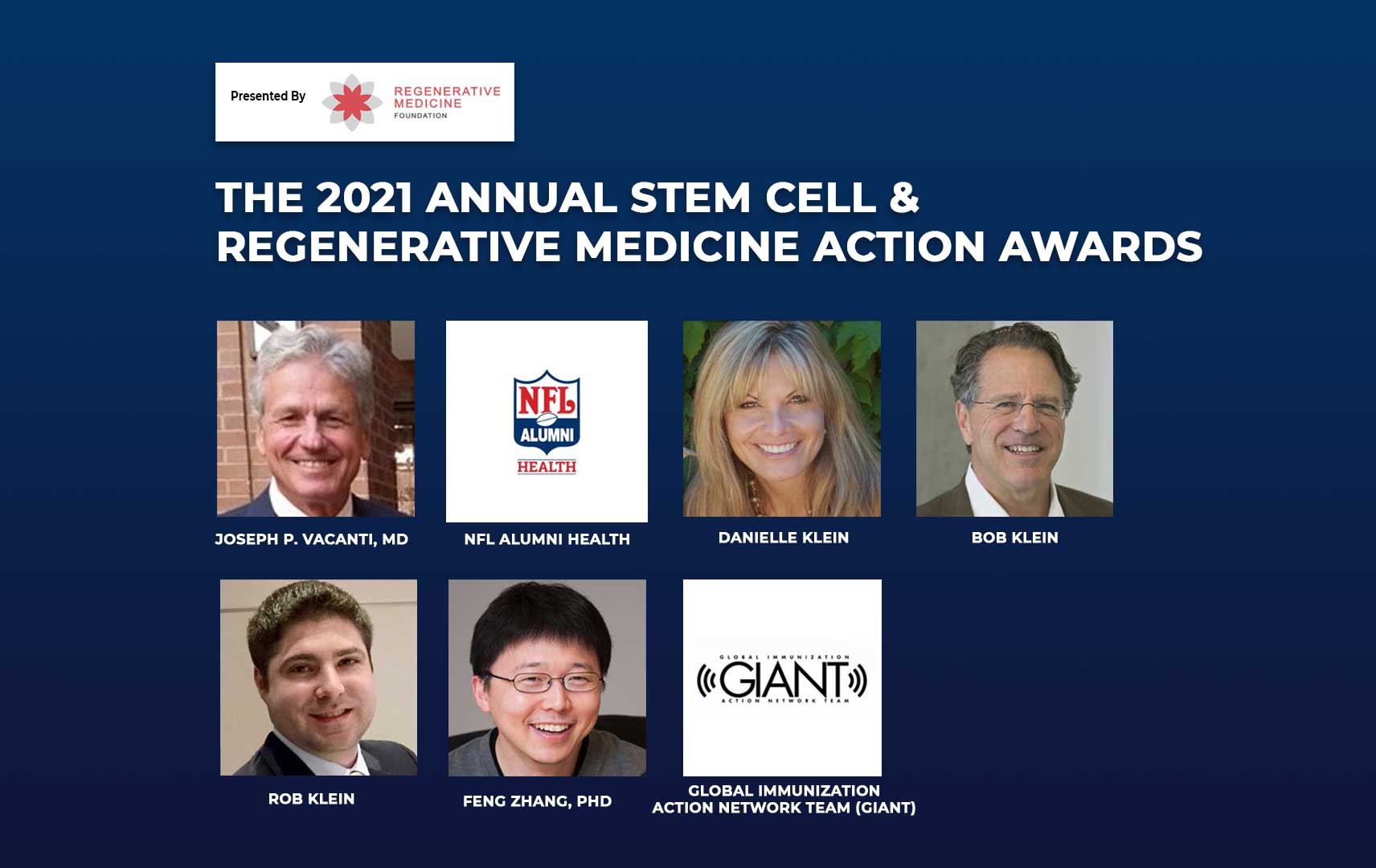On June 9 at 7:00 PM EDT, Regenerative Medicine Foundation (RMF) broadcast the Stem Cell and Regenerative Medicine Action Awards as part of the combined virtual 17th annual World Stem Cell Summit (WSCS) and Wake Forest Institute for Regenerative Medicine and RMF’s Regenerative Medicine Essentials Course, taking place June 6-11, 2022.
Bernard Siegel, Executive Director of Regenerative Medicine Foundation and founder of the World Stem Cell Summit, said, “Through the Stem Cell and Regenerative Medicine Action Awards, outstanding individuals and organizations are recognized for their devotion to improving health and developing cures through advocacy, innovation, leadership and education. This year’s distinguished honorees are truly an inspiration who make remarkable contributions to the field every single day.”
Meet the 2022 Stem Cell & Regenerative Medicine Action Award recipients:
Lifetime Achievement Award :
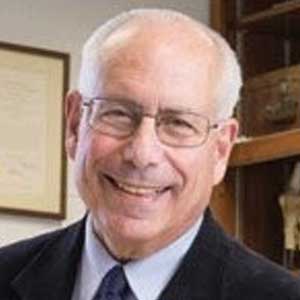 Arnold I. Caplan, PhD – The “father” of MSCs, Professor Caplan is the Director of the Skeletal Research Center at Case Western Reserve University. In his long career, Arnold has left an indelible mark on the field of developmental biology, as a guru for MSC research and translation. He has trained and mentored over 150 researchers and is credited with more than 400 published papers and manuscripts. His remarkable efforts to understand the development, maturation and aging and regeneration of cartilage, bone, skin and other mesenchymal tissues have long been supported by the National Institutes of Health and other nonprofit and for-profit agencies. His collaborations have helped define the immunoregulatory and tropic activities of MSCs, as manifested by the secretion of a complex array of bioactive molecules at sites of tissue injury or inflammation. With the identification of MSCs as perivascular cells, or pericytes, he has proposed how MSCs function in vivo at sites of tissue regeneration and, thus, defined the logics for self-repair within the context of regenerative medicine. After noting MSC’s controlling role in the regeneration of damaged tissue, Arnold boldly calls for MSCs to be renamed medicinal signaling cells.
Arnold I. Caplan, PhD – The “father” of MSCs, Professor Caplan is the Director of the Skeletal Research Center at Case Western Reserve University. In his long career, Arnold has left an indelible mark on the field of developmental biology, as a guru for MSC research and translation. He has trained and mentored over 150 researchers and is credited with more than 400 published papers and manuscripts. His remarkable efforts to understand the development, maturation and aging and regeneration of cartilage, bone, skin and other mesenchymal tissues have long been supported by the National Institutes of Health and other nonprofit and for-profit agencies. His collaborations have helped define the immunoregulatory and tropic activities of MSCs, as manifested by the secretion of a complex array of bioactive molecules at sites of tissue injury or inflammation. With the identification of MSCs as perivascular cells, or pericytes, he has proposed how MSCs function in vivo at sites of tissue regeneration and, thus, defined the logics for self-repair within the context of regenerative medicine. After noting MSC’s controlling role in the regeneration of damaged tissue, Arnold boldly calls for MSCs to be renamed medicinal signaling cells.
Leadership Award:
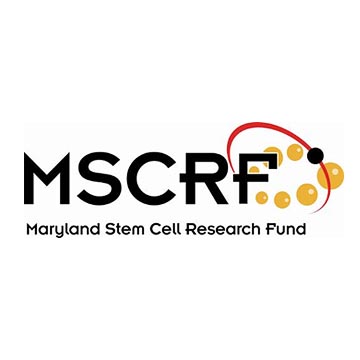 Maryland Stem Cell Research Fund – Maryland made a visionary investment in regenerative medicine when it created the Maryland Stem Cell Research Fund (MSCRF). The purpose of MSCRF is to accelerate stem cell research and cures through grants awarded to public and private entities in the state. Led by stem cell scientist and thought leader Dr. Amritha Jaishankar, MSCRF identifies and fosters cutting-edge research and innovation in the field of regenerative medicine in Maryland. MSCRF’s Accelerating Cures initiative comprises programs that both help transition human stem cell-based technologies from the bench to the bedside and provide mechanisms to build and grow stem cell companies in Maryland.
Maryland Stem Cell Research Fund – Maryland made a visionary investment in regenerative medicine when it created the Maryland Stem Cell Research Fund (MSCRF). The purpose of MSCRF is to accelerate stem cell research and cures through grants awarded to public and private entities in the state. Led by stem cell scientist and thought leader Dr. Amritha Jaishankar, MSCRF identifies and fosters cutting-edge research and innovation in the field of regenerative medicine in Maryland. MSCRF’s Accelerating Cures initiative comprises programs that both help transition human stem cell-based technologies from the bench to the bedside and provide mechanisms to build and grow stem cell companies in Maryland.
Devoted to improving health and advancing cures, the investment in MSCRF is a success story with sustainable impact. It has supported over 500 stem cell projects and nearly 1,700 jobs, which are associated with more than $145 million in compensation and $381 million in economic activity in Maryland. This economic activity has generated almost $14 million in revenue for the state and for local governments, demonstrating that the State of Maryland has “done well while doing good.” Moreover, innovative treatments and cures for diseases, as well as improvements in quality of life and life expectancy, are worth billions in social and economic value for Marylanders.
Pathfinder Award:
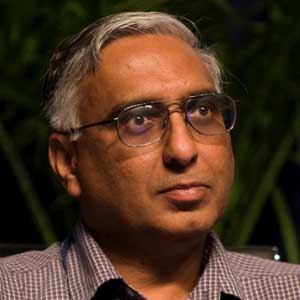 Dr. Mahendra Rao – From discovery to translation, Dr. Rao has had an exemplary career in advancing the field of stem cells. He is internationally known for his research on pluripotent cells and has over two decades of experience in the academic aspects of the field in addition to government, regulation, industrial and clinical applications of stem cells. He served as the founding director of the Center for Regenerative Medicine (CRM) at NIH, where he oversaw the generation of 400 induced Pluripotent Stem Cell (iPSC) lines slated for use in clinical therapies for a range of degenerative disorders. He has served as scientific advisor to companies and foundations including Life Technologies (now Thermo Fisher Scientific) and the New York Stem Cell Foundation (NYSCF). Mahendra has also worked with the FDA and has served on advisory panels to the governments of the U.S., Singapore and India on policies regarding hESCs (human Embryonic Stem Cells). Presently he serves as a member of the Board of panCELLa and CEO of Implant Therapeutics, a company based on his scientific discoveries.
Dr. Mahendra Rao – From discovery to translation, Dr. Rao has had an exemplary career in advancing the field of stem cells. He is internationally known for his research on pluripotent cells and has over two decades of experience in the academic aspects of the field in addition to government, regulation, industrial and clinical applications of stem cells. He served as the founding director of the Center for Regenerative Medicine (CRM) at NIH, where he oversaw the generation of 400 induced Pluripotent Stem Cell (iPSC) lines slated for use in clinical therapies for a range of degenerative disorders. He has served as scientific advisor to companies and foundations including Life Technologies (now Thermo Fisher Scientific) and the New York Stem Cell Foundation (NYSCF). Mahendra has also worked with the FDA and has served on advisory panels to the governments of the U.S., Singapore and India on policies regarding hESCs (human Embryonic Stem Cells). Presently he serves as a member of the Board of panCELLa and CEO of Implant Therapeutics, a company based on his scientific discoveries.
Advocacy Award:
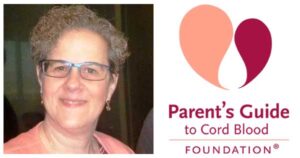 Frances Verter, PhD and the Parent’s Guide to Cord Blood Foundation – Frances founded the Parent’s Guide to Cord Blood in 1998 in memory of her daughter Shai. After earning her PhD in astrophysics from Princeton University, her life changed unexpectedly when her daughter was diagnosed with cancer. As Shai’s mother, Frances became a devoted patient advocate in order to take better care of her child. Her training as a scientist enabled her to review medical research relating to Shai’s diagnosis and seek out treatment from the best doctors and hospitals. After Shai passed away, Frances went on to have more children and decided to bank their cord blood privately. Investigating the cord blood banks available at that time led her to form the Parent’s Guide to Cord Blood website, as a consumer guide. For many years, the website was a community service that she did on the side of her day job at NASA. Eventually she became a full-time patient advocate, leaving her job at NASA. In 2007, she incorporated the non-profit foundation. The Foundation provides a “go to” education for expectant parents to learn the use of cord blood in clinical trials. Frances regularly attends conferences, gives talks, and publishes articles. She is a preeminent patient advocate, friend of many and serves as the trusted guide to the field of cord blood and other birth tissues.
Frances Verter, PhD and the Parent’s Guide to Cord Blood Foundation – Frances founded the Parent’s Guide to Cord Blood in 1998 in memory of her daughter Shai. After earning her PhD in astrophysics from Princeton University, her life changed unexpectedly when her daughter was diagnosed with cancer. As Shai’s mother, Frances became a devoted patient advocate in order to take better care of her child. Her training as a scientist enabled her to review medical research relating to Shai’s diagnosis and seek out treatment from the best doctors and hospitals. After Shai passed away, Frances went on to have more children and decided to bank their cord blood privately. Investigating the cord blood banks available at that time led her to form the Parent’s Guide to Cord Blood website, as a consumer guide. For many years, the website was a community service that she did on the side of her day job at NASA. Eventually she became a full-time patient advocate, leaving her job at NASA. In 2007, she incorporated the non-profit foundation. The Foundation provides a “go to” education for expectant parents to learn the use of cord blood in clinical trials. Frances regularly attends conferences, gives talks, and publishes articles. She is a preeminent patient advocate, friend of many and serves as the trusted guide to the field of cord blood and other birth tissues.
